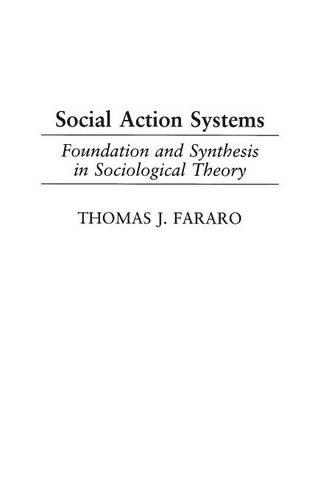
Social Action Systems: Foundation and Synthesis in Sociological Theory
(Hardback)
Publishing Details
Social Action Systems: Foundation and Synthesis in Sociological Theory
By (Author) Thomas J. Fararo
Bloomsbury Publishing PLC
Praeger Publishers Inc
30th September 2001
United States
Classifications
Tertiary Education
Non Fiction
Social and political philosophy
301.01
Physical Properties
Hardback
336
Width 156mm, Height 235mm
680g
Description
Analyzes the phases of general theoretical sociology using a process philosophical approach in an effort to integrate and unify the field. Fararo studies general theoretical sociology as a time-extended tradition with three phases: classical, postclassical, and recent. Employing a process philosophical approach, the author seeks to examine these three phases in an effort to provide a synthesis of the theories that seek to lay the foundations of theoretical sociology. The author especially focuses on the work of Talcott Parsons and George Homans, two contemporary theorists whose common aspiration was to forge a theoretical foundation for sociology that would serve to unify and integrate all theories growing out of sociological research in much the same way that the theory of evolution guides and integrates all other biological theories. To begin, the author provides a history and overview of the key classical theoretical frameworks from the perspective of process philosophy, which he applies to all three phases of the study. Fararo then carefully analyzes two major postclassical bodies of general theory, namely the evolving and intertwined frameworks of Parsons and Homans from their early theories of social systems to their later divergent perspectives on foundation and synthesis in sociological theory. Finally, the discussion turns to the recent phase of general theoretical sociology, where more recent foundation strategies - rational choice theory and generative structuralism - are analyzed in relation to the postclassical phase of the tradition. This important and sophisticated new work is essential for all those interested in sociological theory in particular and sociology in general.
Reviews
"[Thomas Fararo] has been the most persistent and original scholar working on the implications of Whitehead's philosophy for basic sociological theory. He has brought a wide range of resources to this task, including intensive critical readings of several leading theorists of the current and the past two generations...and a gift for explaining difficult issues directly and clearly....The ultimate importance of the work is that it will likely be recognized as a pivotal contribution to overcoming the dissension and conflict among schools that has dominated the last forty years of work in sociological theory....[T]his is a book that all graduate students in sociology with any interest in theoretical work should read....[T]he ambitious advanced undergraduate can benefit from the book as well."-Victor Lidz Acting Director Institute for Addictive Disorders Department of Psychiatry School of Medicine MCP Hahanemann University
"A deep, insightful critique of classical, post-classical, and contemporary theoretical strategies that reconstructs the foundations of sociology at the most general level and readdresses such key presuppositional problems as the emergence, stability, change, and comparison of social structures. Ranging widely over past and present theory it is guided by the spirit of unification'--not necessarily synthesis as a finished product, but commitment to the value of integration and the conditions which encourage its production and understanding, exhibited, on the one hand, in its focus on foundations, on the other in actual episodes of partial synthesis. Both forms of unification find their resources in a penetrating, critical rethinking of post-classical theory--in Whitehead's analytical realism and process world view, in Parsons' and Homans' incorporation of them into a systems approach to sociology."-Morris Zelditch Emeritus Professor of Sociology Stanford University
[A] fascinating display of new ideas....[A] fresh rethink about the current state of sociological theory. Even if one does not subscribe to the general, formal and mathematical sort of theorizing shown here, Fararo's propounding of his arguments carries new and important insights about the theoretical work of conceptualizing social phenomena- and thus, of the collective enterprise of the sociological profession.-European Journal of Social Theory
An unpretentious effort that should appeal to theory buffs.-American Journal of Sociology
Thomas Fararo has written and extremely stimulating and well-informed book about the evolution of major traditions in sociological theory and the possibility of their integration into an increasingly comprehensive theoretical framework...extremely stimulating and compulsory reading for all social scientists interested in the advancement of social theory.-Contemporary Sociology
"A fascinating display of new ideas....A fresh rethink about the current state of sociological theory. Even if one does not subscribe to the general, formal and mathematical sort of theorizing shown here, Fararo's propounding of his arguments carries new and important insights about the theoretical work of conceptualizing social phenomena- and thus, of the collective enterprise of the sociological profession."-European Journal of Social Theory
"An unpretentious effort that should appeal to theory buffs."-American Journal of Sociology
"Thomas Fararo has written and extremely stimulating and well-informed book about the evolution of major traditions in sociological theory and the possibility of their integration into an increasingly comprehensive theoretical framework...extremely stimulating and compulsory reading for all social scientists interested in the advancement of social theory."-Contemporary Sociology
"[A] fascinating display of new ideas....[A] fresh rethink about the current state of sociological theory. Even if one does not subscribe to the general, formal and mathematical sort of theorizing shown here, Fararo's propounding of his arguments carries new and important insights about the theoretical work of conceptualizing social phenomena- and thus, of the collective enterprise of the sociological profession."-European Journal of Social Theory
Author Bio
THOMAS J. FARARO is Distinguished Service Professor of Sociology at The University of Pittsburgh, where he has been since 1967. His most recent books include The Meaning of General Theoretical Sociology, Rational Choice Theory: Advocacy and Critique (co-editor), and The Problem of Solidarity: Theories and Models (co-editor).
